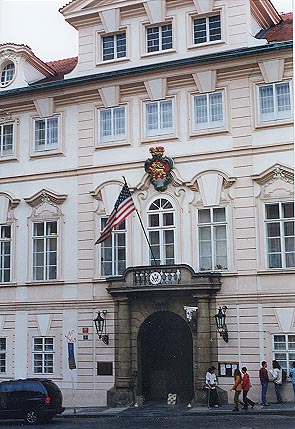
I get the questions all the time:
What brought you to Prague? Why Prague?
And then – Why have you stayed?
Accompanied by - Don’t you miss your family? Don’t you ever want to go home?
The first pair of questions is easily dispensed with for they are questions of fact. Peace Corps sent me to Czechoslovakia and after my two years in Ústí nad Labem, I decided to move to Prague because I liked it.
The last questions, the afterthoughts, are also simple. No, in fact, I don’t really miss my family. I love them, I visit them, but they have their lives and I have mine. And, I’m sorry, what do you mean by home? I am at home here and no, I don’t see myself returning to the US.
And then the ‘why have you stayed?’ question becomes more philosophical. My answer has changed over the years, but I think I have finally now hit on the right one, although it is never easy to explain.
The answer is that I am more free here. It is not freedom in the sense that I can roll a spliff and smoke dope on the street without fear of arrest, or freedom in the sense that there are no licensing hours and I can find an open bar round the clock, though those are things that I appreciate. It is the deeper personal freedom that makes my life here more appealing.
My friends with whom I grew up, and my sisters, are mostly married with children, they own homes and have careers that are important to them, or their own businesses. If I had stayed in the US, these are the things that would have been expected of me, and I would have suffered from the weight of the expectations.
Most of my close friends here in Prague are also expatriates. It is not because of the language or the similarities in how we grew up. As an example, one of my friends grew up in East Germany. It is that we have more in common because we live in a country that is not our own and we have all escaped the weight of the expectations.
I am not talking about professionals who have been sent here by their corporations for a few years or backpackers who settle in to teach English for a year or two, I am talking about those of us who have stayed on and have no plans to leave. Some of my ex-pat friends, even a couple of former Peace Corps volunteers, do own homes and are married and have children here. I am not talking about them either, because their raison d’être has metamorphosed into something else.
I am considered mainstream by some of my friends because I have a real job in which I can take sick days and I get paid holidays. It has not always been like that for me. I am glad that it is like that for me now because I hate to have to worry about making my rent, but sometimes I resent having to spend 40 hours every week in an office.
I can say that I am a lawyer, but I am not yet qualified to practice anywhere. If I were still in England, I would be a trainee solicitor, and I think I would hate it. My job is different here, and it now looks like I am on an accidental path to qualifying as a Czech advocate; the title of European advocate will follow that. Or I can just continue doing what I am doing – writing, editing and marketing, and no one around me will ask me condescendingly why I am wasting my time and talents by not qualifying. No one cares, as long as I am satisfied.
kd teaches English, Mike works in a bar between acting jobs, Sunshine drives an airport taxi, I still haven’t figured out what some of my other friends do for a living. No one cares, we don’t judge each other on that.
Jono was over here from London last weekend. We were talking about his impending purchase of a flat there. Finally, he asked me, “Will you ever consider buying a flat in Prague?” When I answered no, that I was not interested in owning property, he smiled, relieved, and said, “I don’t know what I would do if you suddenly wanted to do something as normal and mundane as that.”
At Easter dinner, an older friend of AG’s was quizzing me on why I didn’t want to have children. That answer could, of course, be another entire essay, but it too would come round to the freedom thing.
A lot of Czechs who are living a ‘normal’ life in their own country think that ex-pats as a group are mad as a box of frogs, but that also works to our advantage – they have no expectations for us either.
 Dallas, Texas, April 2000
Dallas, Texas, April 2000















